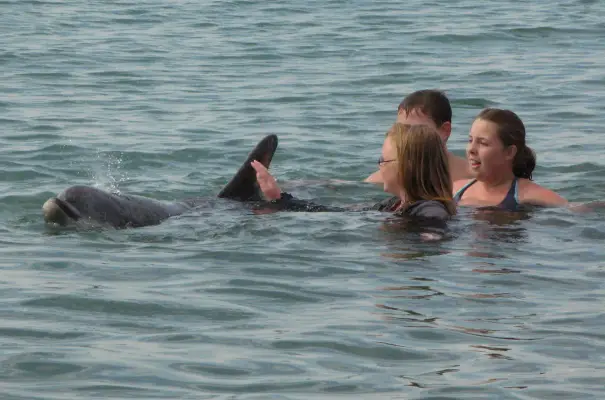The BDMLR (British Divers Marine Life Rescue) was formed to protect wild animals at sea. They train over 400 volunteer Marine Mammal Medics a year. With the recent sighting of a previously unknown dolphin in our waters, they’ve contacted OnTheWight to help spread their advice. This, in their words. Ed
BDMLR was made aware of people interacting with a solitary dolphin in Portsmouth Harbour on Thursday 29th June. This is the same animal that was sighted off the Isle of Wight and does not appear to be a known solitary dolphin.
Solitary dolphins are not uncommon around the UK coastline and when they show up, there are a number of welfare problems associated with their presence. Bottlenose dolphins are wild and powerful animals that are known to cause both accidental and deliberate harm to other marine mammals and humans.
Sexual aggression
Another solitary dolphin, known as ‘Randy,’ frequents waters off the UK coast and Europe. He has attacked men and displayed sexual aggression towards women who enter the water with him.
Additionally, a solitary female, known as ‘Dusty’, becomes very territorial and has attacked and hospitalised several swimmers.
Injury and death of dolphins
The dolphins are also at risk from human interactions, becoming habituated until they lose their fear of people and boats. This can exacerbate incidents of aggression from the dolphins towards humans and has also resulted in the injury and death of solitary dolphins.
In 2006, a dolphin, known as ‘Davina,’ appeared off the coast of Folkestone, Kent. Over time, she started pushing people around in the water and preventing swimmers from exiting. She received several injuries from fishing lines and boat propellers, requiring veterinary intervention. One laceration was so severe it was deemed life-threatening. Davina was last sighted in November 2007 and it is likely that she died from wound infection.
Illegal to disturb dolphins
It is the habituation process that can result in solitary dolphins actively seeking out human interactions. This soliciting behaviour does not negate the dangers involved. Furthermore, interactions with wild dolphins may break the law. It is illegal to disturb or harass dolphins in UK waters and can result in criminal conviction, (including hefty fines and/or jail time), as was the case when two men went for an early morning swim with Davina.
Passing of disease between humans and dolphins
Interacting with dolphins runs the risk of zoonotic disease transfer, which is the passing of contagious diseases between humans and dolphins. There are known cases in the UK where people have been infected by dolphins with pneumonia and meningoencephalitis, although the disease transmission can work both ways.
Given the threat of harm posed to this solitary dolphin in Portsmouth, as well as to the people interacting with it, BDMLR is urging people not to enter the water with it. We appreciate how unusual and exciting it is to have the opportunity to see these majestic creatures from our shores, but please dolphin-watch responsibly from land. This ensures you and the dolphin stay safe.
Actions you can take
Here are three actions you can take to help protect this dolphin:
- If you want to see the dolphin, please don’t get in the water with it – instead, watch the dolphin from land.
- Share this information to help educate people about responsible dolphin watching and to discourage individuals from getting in the water with the dolphin;
- Please report any incidents of disturbance of the dolphin via our hotline on 01825 765 546 or to the police, preferably with video and photo evidence to identify individuals acting inappropriately.
Image: Thanks to the BDMLR





